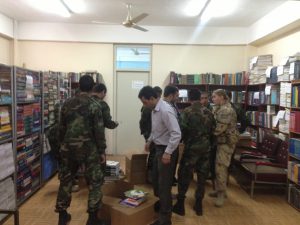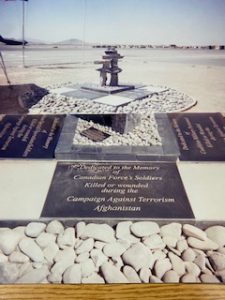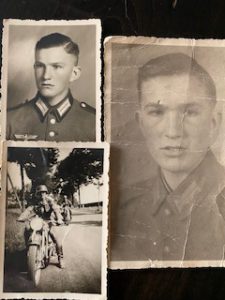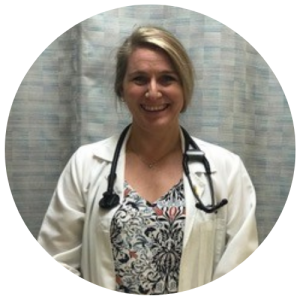Share
Reflections of Remembrance
Back to MessengerBy Warrant Officer (retired) Kirsten Luomala, CD, DMSc, MPAS, CCPA
Read time: 4 minutes
As one of CPSA’s new Physician Assistant members, I am honoured that our Registrar Dr. Scott McLeod asked me to share my reflections on Remembrance Day.
Unlike Dr. Neil Gibson, who in 2019 wrote about his family’s multiple generations of service to Canada, I was adopted into a family that had no connection to military service since the American Civil War. My family immigrated from Norway and the USA, and have resided in Canada since before World War II. My grandparents were not yet Canadian citizens and being farmers, they were exempt from military service. As I prepared to write this article, my mother mentioned that while my family took time each year to remember the fallen, it did not always have a lot of significance in our home. It wasn’t until I joined the local army cadets and stood sentry at the local cenotaph that my family started to regularly observe Remembrance Day ceremonies.

It has been almost four decades since I was introduced to the military. My cadet experience led me to a career in the Canadian Armed Forces before I joined the Medical Corps in 1987 and served for 26 years. I started out as a medical technician and after 20 years became a physician assistant. During that time, I deployed to Haiti, Afghanistan twice and Canadian Forces Station (CFS) Alert in Nunavut. My first deployment to Afghanistan was less than six months after 9/11. It was during this deployment that I truly came to appreciate the sacrifices of soldiers before me. I was a young mother at the time, with two small children who I left behind with my husband while I went to war.
During this deployment, Canada lost its first four casualties to the Afghanistan War. Twenty years later, I can still hear the news crackling through on the radio that we had eight wounded coming to us and four killed in action.

I can only describe that first ramp ceremony as simply the most emotional day of our lives for many of those on this deployment. Watching the strongest airborne soldiers break into tears was gut wrenching. It was heartbreaking knowing we were sending our four boys home to a wife and fiancées who would never grow old with them. Over the next 13 years, Canada went on to lose a total of 158 soldiers to the war, and many more were wounded in Afghanistan. Almost as many have fallen victim to PTSD since coming home. Being an extremely small military, the impact was immeasurable, and I knew many of the fallen and wounded.
A few years after joining the military, I met my biological family and discovered my paternal grandfather (Opa) had served in World War II for Germany’s military. He was drafted against his will at age 16 and sent to the Russian front, surviving the Battle of Stalingrad as a telegraph runner. He passed away a few years ago, but not before impressing upon me the horrors of World War II—not only the battles, but what Germany had done and his deep shame for that.
Opa spoke of being on the Russian front in the dead of winter. Having thought the German military would secure Russia in a summer, there was not enough winter clothing for all the soldiers and they had to share their winter clothes. Coats were reserved for the front line, so they had to crawl, without coats, in the snow and mud back to their tents, seeking the warmth of the fire. He would fall silent when he tried to speak of his fallen friends, with tears and a faraway look in his eyes. I can only imagine what he was thinking. My Opa had great pride in my service to Canada and started to attend local ceremonies after we met, talking of his granddaughter who, in his eyes, had brought honour back to his family.

During my service I met my husband, and together we have three daughters. My husband also served as an armoured soldier for 20 years with deployments to Bosnia and Cyprus. Our daughters grew up having one of us gone regularly. At one point in a three-year span, we had spent less than one year together—often the case when both parents are serving. Having to move about every four years, my daughters witnessed firsthand what military families endure. Our oldest daughter is now in the process of enrolling in the military to become a third-generation soldier.
For veterans, we remember every day the sacrifices that so many have made and continue to make. But on Remembrance Day, we gather in silence to reflect on those who gave the ultimate sacrifice. This is no different for my family, who attend our local cenotaph every year to reflect on the friends we have lost during our service and those from World Wars I and II. It is reassuring to see so many who have not served continue to attend services and join in our remembrance.
I humbly ask that on the eleventh month, on the eleventh day, at the eleventh hour, we all take a moment to remember those who paid the ultimate price for our freedom. If you attend a ceremony, take a moment to interact with a veteran in attendance and hear their story.
 |
Warrant Officer (retired) Kirsten Luomala is a physician assistant (PA) in the department of Neurosurgery at the University of Alberta Hospital. She served 26 years in the Canadian Armed Forces as a medical technician and physician assistant, and retired in 2014 to accept a PA position in the Alberta Demonstration Project. Kirsten is the current Alberta Director to the Canadian Association of Physician Assistants. |
























Comments for this post are now closed. If you would like to share your feedback on this topic, please email support@cpsa.ca.